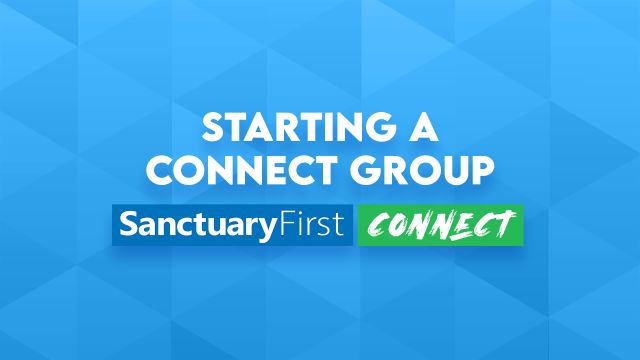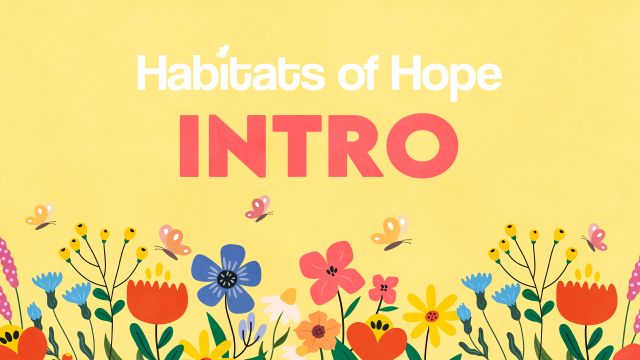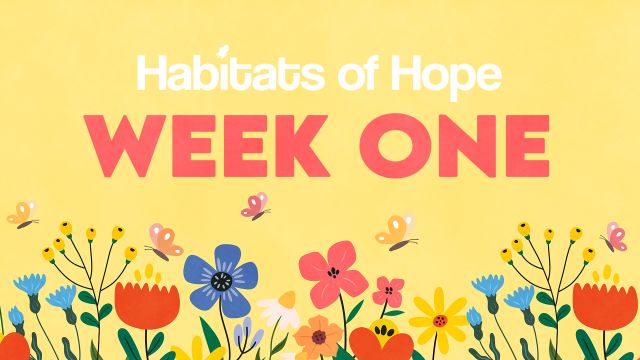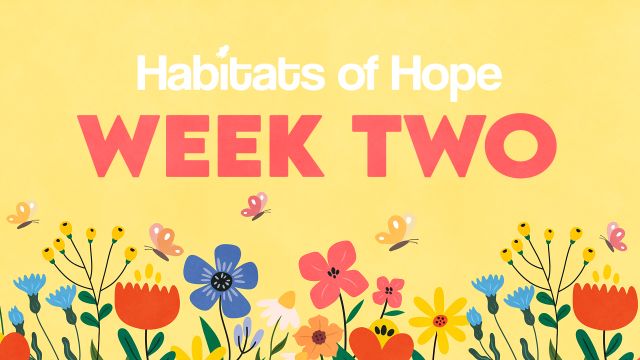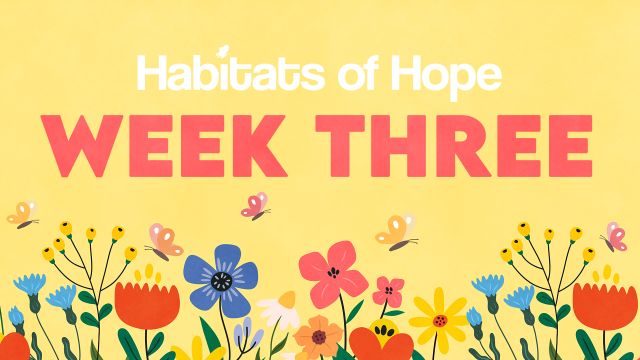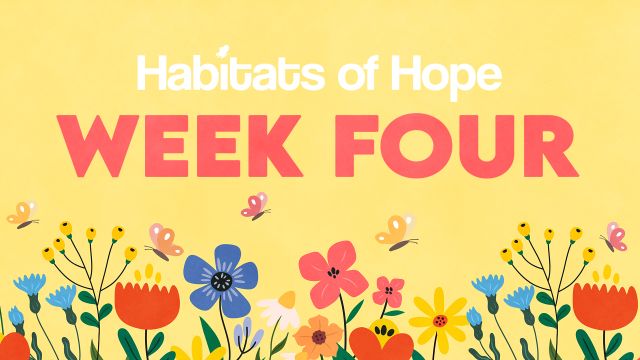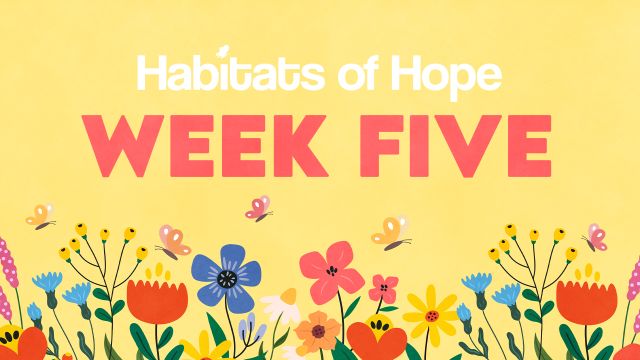Habitats of Hope - Connect Groups
What Are Connect Groups?
What are Connect Groups?
‘Connect Groups’ is the name we give to small informal gatherings who decide to meet together to explore the Bible alongside our monthly themes. These groups are independent and folk can simply set up their own Connect Group themselves, meeting together with friends and family on their own basis. In this time of Lockdowns when people can’t get together physically this material can still be used to meet together online.
Each month we produce a range of questions to adapt our themes for group discussion. The material is offered as a starting point and there is no need to go through all the questions.You can pick and choose, tailoring it to suit the needs and interests of your group. Each ‘Part’ could form the basis of a weekly roughly 90 minute meeting but you could break it up differently. Let us know if you would like to find out more about Connect Groups and different ways of linking into the Sanctuary First community.
We all come to the Bible with our own questions, insights and barriers. The guiding principle we have in writing these is to ask questions we don’t already know the answer to! Our hope is to facilitate open-ended discussions. Often the most valuable parts of group chats are the bits that go off on bizarre tangents. And there’s nothing wrong with that. Jesus knows a thing or two about bizarre tangents…
Need some advice on starting your own Connect Group?
Get in touch.
Introduction
Introduction
Nests, harvests, homes, ecosystems and habitats!
 Join us as this month as we look to cultivate hope! A five week theme about nature, ecology and how we can enthuse and empower one another to tackle the myriad challenges we face as a planet. We will be using nests, harvests, homes, ecosystems and habitats to reflect on nurturing an attitude of hope in our world as disciples of the hope bringer: Jesus Christ.
Join us as this month as we look to cultivate hope! A five week theme about nature, ecology and how we can enthuse and empower one another to tackle the myriad challenges we face as a planet. We will be using nests, harvests, homes, ecosystems and habitats to reflect on nurturing an attitude of hope in our world as disciples of the hope bringer: Jesus Christ.
This August, as we look around about us we are taking hope! We’re going to seek it, nurture it, carefully cultivate it, and celebrate its blossoming as we discover what the natural world can help us learn about our faith… and what our faith can teach us about the natural world.
As our Habitats of Hope theme begins we want to explore what we can learn from the metaphor of nest building. Nests are not fixed, birds often remake them season by season perhaps returning to the same location but rebuilding anew. A nest while offering a sense of security, is not so much a way for a bird to hide away from the world — but rather for them to find a place in it. How could building a nest with God each year be helpful way of thinking about our relationship with God?
When we think about habitats we also think about harvests and how our harvests can harm them. When we work the land we can make choices that work with it or against it. In the last hundred years we have made phenomenal leaps in productivity, producing enormous amounts of food to feed millions of people. But sometimes this has been done at the cost of the land itself causing degradation, habitat loss and pollution.
How can we ensure homes for all of humanity and nature? The vision we are given in Psalm 85 of righteousness and peace kissing is a tender image of restoration and togetherness. When righteousness and peace are kept apart — conflict and inequality rise. Peace isn’t simply the absence of war, it’s the presence of something: a habitat where the qualities of peacefulness can blossom, where homes can be made.
As people who cherish and value the world we have been entrusted with for our flourishing — what on earth can we learn from the habitats we are in danger of erasing completely before it’s too late? What do we learn from the desert, the fields, the forests, the ocean? How can we rediscover humility and awe, and in that space — hope also.
So, having sought hope as nest builders, tended to it as harvesters, lived it as dwellers, and cultivated ecosystems to nurture it… we will conclude out theme by asking how do we hold on to habitats of hope?
Look around, it’s time to take hope!
SEEDS TO SOW: We have a 'Seeds to Sow' phrase at the beginning of each section. These are open-ended and optional and are designed for people wanting to develop their own ideas/resources in response to the material. Perhaps if using this material as a group you could use these prompts to inspire a time of prayer, or drawing, or creative writing? They are intended to be short and sweet, simply a starting off place for you and your imagination, be encouraged to tailor/develop as suits your group.
Download the Discussion Questions as a PDF
These discussion questions adapt our monthly themes for small Connect Groups or personal Bible study. The questions are divided into 5 parts to correspond with the 5 weeks of the Daily Worship theme. They are offered as a guideline and there is no need to go through all the given questions in a single session, or in the following sequence. Feel free to pick and choose, or adapt to what interests you or your group.
Find how to get involved: Connect group Blog
Week One
Nests of Hope
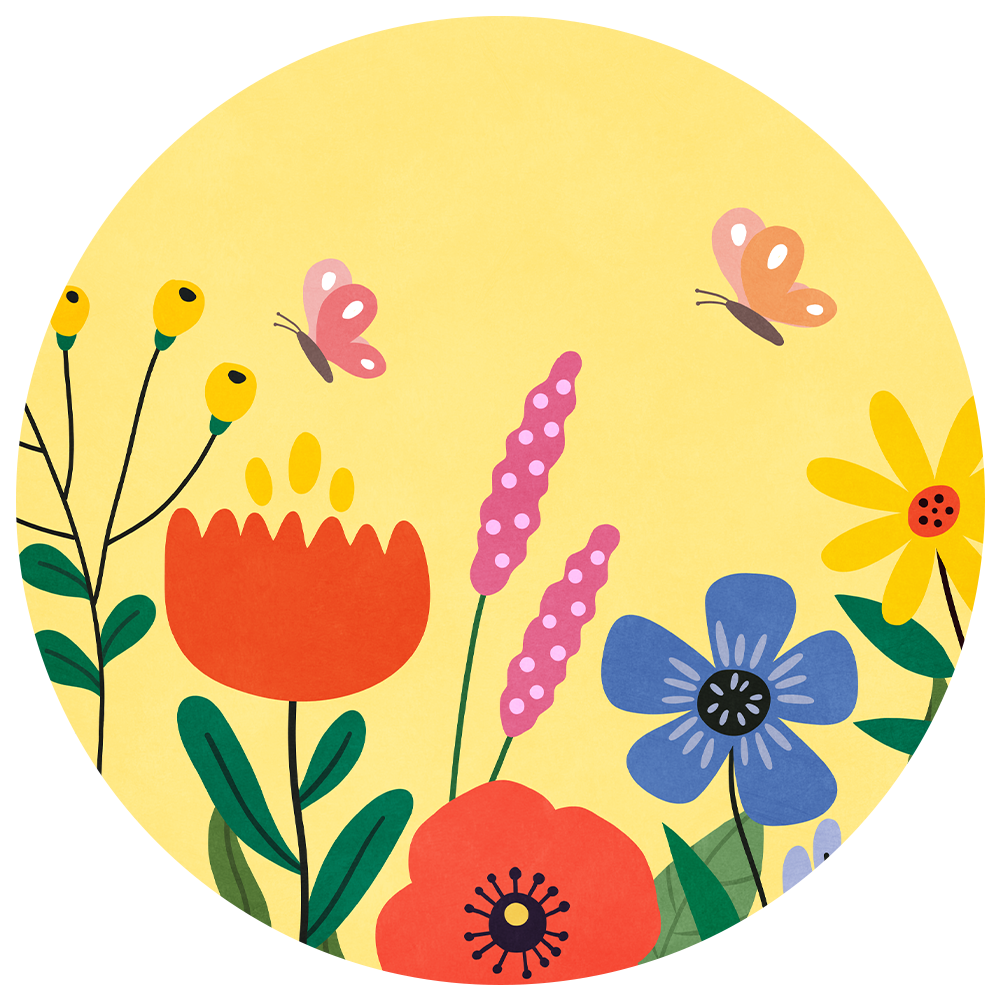 When a bird starts gathering twigs and moss they are acting in hope, working towards an uncertain but willed for future. When summer holidays begin to draw to a close and a new season approaches we start putting together a new bundle of ideas about the months ahead: names we’ll be remembering, gifts we’ll be nurturing, cares we’ll be carrying. Perhaps there will be: particular song lyrics, Bible verses, quotes from books, and conversation with friends we’ll be weaving into this year’s nest.
When a bird starts gathering twigs and moss they are acting in hope, working towards an uncertain but willed for future. When summer holidays begin to draw to a close and a new season approaches we start putting together a new bundle of ideas about the months ahead: names we’ll be remembering, gifts we’ll be nurturing, cares we’ll be carrying. Perhaps there will be: particular song lyrics, Bible verses, quotes from books, and conversation with friends we’ll be weaving into this year’s nest.
SEEDS TO SOW: ARE WE MAKING IT EASY FOR WILDLIFE TO NEST AND FIND A HOME IN OUR LOCAL NEIGHBOURHOODS? *
Read Psalm 84: 3 (we suggest you read the whole psalm and then return to focus on verse 3)
Nest making anew.
Why do you think the psalmist includes this reference to birds nesting? What do you think it tell us about our relationship with God?
Read 1 Kings 3: 5-12
Triangulating.
Let’s reflect on the keen-eyed owlish perception of Solomon who wisely asks for wisdom. During this ‘bird’ week we can think of him as a canny owl looking around, aware of the dangers and opportunities that surround him. Did you know that some species of owls have ears at two different heights!? The asymmetric position helps them to discern where a given sound is coming from. Combined with their night vision it contributes to their uncanny ability to find things in the darkness and has doubtless contributed to their reputation for piercing insight.
The process of discerning between good and evil, of choosing the right path, can be a bit like that… one of working out where the sound is coming from! A place of good, or a place of evil? Like an owl flying through the forest - or a young leader thrown into the deep end in our reading
What are the things that can help us find our way and discern a wise path?
Read Matthew 13: 31-32
A vast nest network!
What would it mean to consciously ‘nest’ each year with God? Taking our place amongst the branches and intentionally working on a place to shelter? Like a bird gathering bits and pieces for their nest, what could we be weaving into our nests for the year ahead? It could be things like particular Bible verses, a meaningful phrase, a verse from a hymn, a particular piece of art, a journey you plan to take… What is going to help you focus on God this year?
* SEEDS TO SOW: These are open-ended and optional prompts and are designed for people wanting to develop their own resources in response to the themes. Perhaps if you are using this material as a group you could use these prompts to inspire a time of prayer, or drawing, or creative writing? They are a short and sweet, simply a starting off place for you and your imagination. Tailor and develop as suits your group.
Week Two
Harvests of Hope
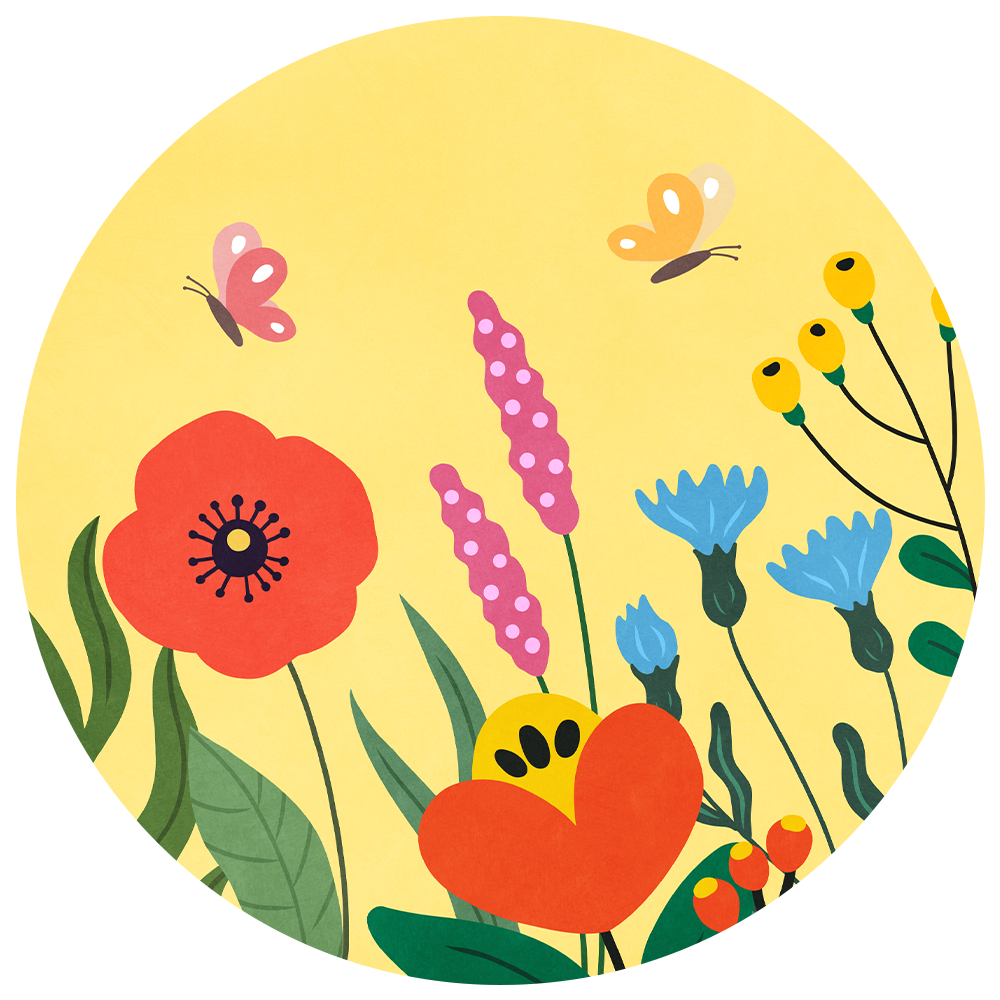 When we work the land we can make choices that work with it or against it.
When we work the land we can make choices that work with it or against it.
In the last hundred years we have made phenomenal leaps in productivity, producing enormous amounts of food to feed millions of people. But sometimes this has been done at the cost of the land itself causing degradation, habitat loss and pollution.
Our response to issues of sustainability is not a lifestyle choice that’s tacked on to the end of our faith, like choosing a nice hessian tote instead of a plastic bag, but a beating question at the heart of it.
If we believe we have been entrusted with a beautiful world and that we owe it to others to feed and care for them - that we have a responsibility for one another beyond borders and continents - then sustainability is crucial.
As grim as the ecological picture can look sometimes we want to sow in hope as a people of hope who wish not to reap in bitterness, but reap in joy.
SEEDS TO SOW: WHERE CAN WE DIRECTLY MAKE A DIFFERENCE IN CARING FOR OUR PLANET THIS WEEK? *
Read Genesis 32: 22-31
Wrestling for answers.
When we face the mounting challenges of extreme weather events, conflict and growing inequality it can be an instinctive action to turn away — from the news, from the problem, from God. But like Jacob, we may learn more by coming to God face to face and refusing to let go…
How of you think Jacob felt as he limped away? What was his mental state like?
Read Micah 6: 9-16
Considering the consequences of an uncaring, and acquisitive culture.
This reading about injustice and dishonesty and a sowing without reaping echo uncomfortably for us today.
How do these ancient words connect to contemporary events?
Read Matthew 14: 13-21
Two solutions.
The disciples suggest that the crowd disperse, spread out, forage. Jesus instead invites them to stay, to get closer together, to share.
What can we learn from this contrast and is there any way we can apply that to how we produce enough food for our world?
* SEEDS TO SOW: These are open-ended and optional prompts and are designed for people wanting to develop their own resources in response to the themes. Perhaps if you are using this material as a group you could use these prompts to inspire a time of prayer, or drawing, or creative writing? They are a short and sweet, simply a starting off place for you and your imagination. Tailor and develop as suits your group.
Week Three
Homes of Hope
 The vision we are given in Psalm 85 of righteousness and peace kissing is a tender image of restoration and togetherness. When righteousness and peace are kept apart: conflict and inequality rise.
The vision we are given in Psalm 85 of righteousness and peace kissing is a tender image of restoration and togetherness. When righteousness and peace are kept apart: conflict and inequality rise.
Peace isn’t simply the absence of war, it’s the presence of something: a habitat where the qualities of peacefulness can blossom.
Peace requires righteousness - people acting with goodness, virtue and integrity. The unrighteousness of millions of people displaced from their homes through war, catastrophe and crop failure; of homelessness and inadequate housing; of unfair systems that punish the poor for being poor; make it incredibly hard to foster peace.
Rather than just wallowing in the doom and gloom, how can we recognise the pain of our world but also do something positive about it? How can we make a world with homes of hope for all?
SEEDS TO SOW:
WHEN DID YOU LAST FEEL ‘UPROOTED’? WHEN DID YOU LAST GO THROUGH AN ‘UPHEAVAL'? AND WHEN DID YOU LAST FEEL ‘UPLIFTED’? *
Read Genesis 37:1-4, 12-28 & Psalm 105: 1-6, 16-22, 45b
Uprooting, upheaval, uplifting.
What does the concept of ‘home’ mean over the course of Joseph’s story?
Read 1 Kings 19: 9-15
On the run, in the quiet.
What interests you, confuses you or challenges you about this passage?
And who today in our world is on the move and needs to hear God in the stillness?
Read Jeremiah 12: 1-4 & Psalm 85: 8-13
The land mourns.
In the psalm righteousness and peace kiss, a vision of security and justice and mercy for all. For peace without righteousness isn’t really peace and righteousness without peace isn’t really righteousness. Which takes us to our Jeremiah reading where prosperity for some does not mean peace for all.
Jeremiah’s complaint contains a very human plea to God: “Why do good things happen to bad people?”And why does the land have to mourn while people exploit it? The poetic point is underlined by biological reality, our actions do have consequences for the soil under our feet. Why does God give us the freewill to mess up ecosystems, why doesn’t God reverse climate change? Why do people live comfortable lives in exchange for making the lives of others miserable?
These questions don’t have easy answers, but through asking them we look to learn more about how to recapture hope and work towards restoring habitats of hope.
* SEEDS TO SOW: These are open-ended and optional prompts and are designed for people wanting to develop their own resources in response to the themes. Perhaps if you are using this material as a group you could use these prompts to inspire a time of prayer, or drawing, or creative writing? They are a short and sweet, simply a starting off place for you and your imagination. Tailor and develop as suits your group.
Week Four
Eco-systems of hope
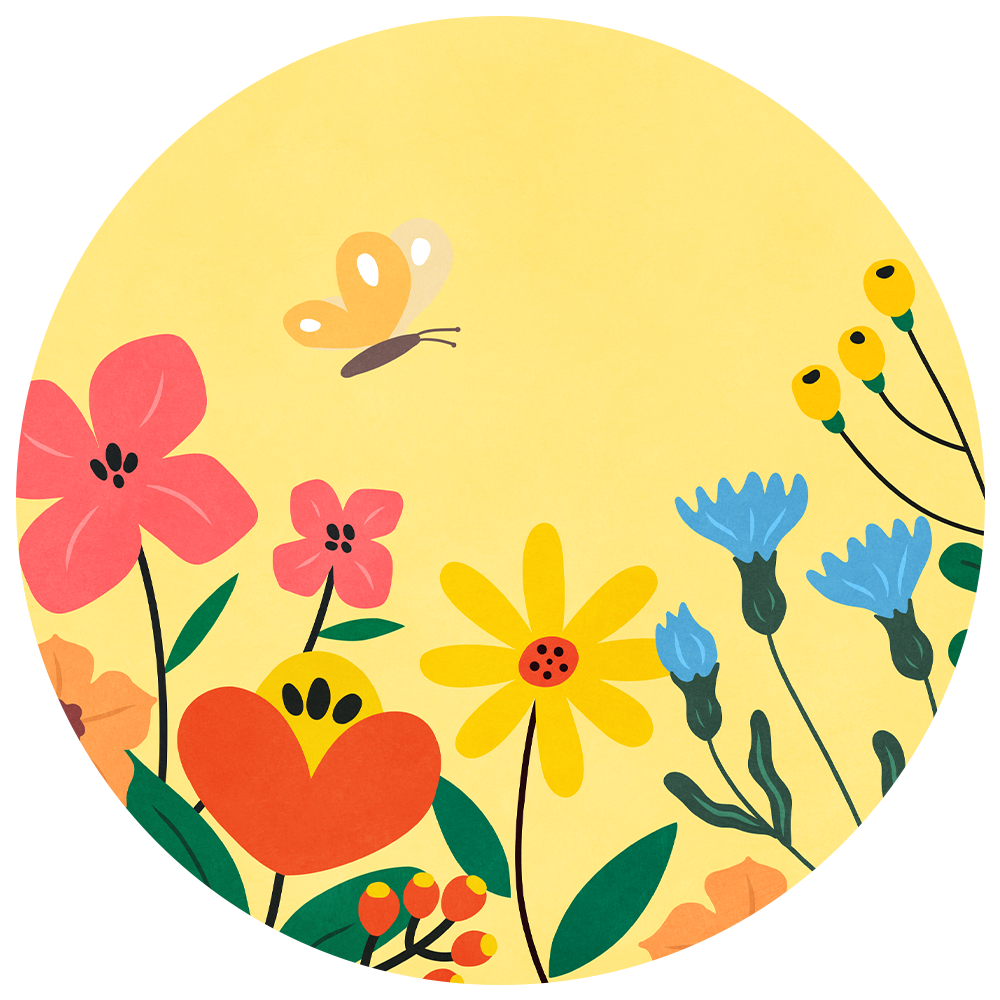 Habitats are complex systems. Flick one lever, change one part and you’ll influence the rest.
Habitats are complex systems. Flick one lever, change one part and you’ll influence the rest.
Scientists sometimes talk about the ‘Anthropocene’, the idea that we humans have made such an impact on the world around us that we are entering a new epoch where human action on the planet is defining this current age, whether it be in wildlife, or meteorology, or geology. Animal, vegetable or mineral, we humans have bulldozed through with our building, farming and processing. As people who cherish and value the world we have been entrusted with for our flourishing.
What on earth can we learn from the habitats we are in danger of erasing completely before it’s too late? What do we learn from the desert, the fields, the forests, the ocean?
How can we rediscover humility and awe, and in that space - hope also.
SEEDS TO SOW: WHAT IS THE CONNECTION BETWEEN HOW WE TREAT THE LAND AND HOW WE TREAT OTHER PEOPLE? *
Read Psalm 133
The pleasantness of unity.
What do you make of the two analogies in this psalm, to the oil on the beard and the mountain dew? What do they tell us about unity?
Read Isaiah 56: 1-8
Drawn into an ecosystem of grace.
God’s ecosystem of grace is about gathering and participation, not conquest and oppression. God does not conquer people to draw them into the fold, they are invited to take part and find a home there.
To the people first hearing this, how must it have sounded it? How would it have affected how they thought about identity, loyalty and belonging?
Read Exodus 23: 9-13
Do not oppress others, do not oppress the land, do not oppress yourself.
Give others a break, give the land a break, give yourself a break! What are the things that tie these three concept together? How does not exploiting others relate to how I work the land? And how does my attitude to the land affect my attitude to myself?
* SEEDS TO SOW: These are open-ended and optional prompts and are designed for people wanting to develop their own resources in response to the themes. Perhaps if you are using this material as a group you could use these prompts to inspire a time of prayer, or drawing, or creative writing? They are a short and sweet, simply a starting off place for you and your imagination. Tailor and develop as suits your group.
Week Five
Holding on to Habitats of Hope
 So, having sought hope as nest builders, tended it as harvesters, lived it as dwellers, and cultivated ecosystems to nurture it.
So, having sought hope as nest builders, tended it as harvesters, lived it as dwellers, and cultivated ecosystems to nurture it.
How do we hold on to habitats of hope?
As this theme draws to a close we take inspiration from different habitats to think about the breadth and depth of the hope that God calls us to.
SEEDS TO SOW: IN ISAIAH 55 THE TREES CLAP. WHAT DO YOU THINK WOULD MAKE TREES CLAP AND CHEER?
Read Exodus 1: 8-22
The hope of women, labouring in the desert.
Shiphrah and Puah — given an impossibly cruel task in an impossibly cruel time — somehow foster a habitat of hope through their ingenuity. Habitats of hope can and do sometimes blossom in the midst of dire circumstances.
What do you think sustained Shiphrah and Puah and sparked their hope?
Read Exodus 2: 1-10
Rivers and survival.
Rivers have always been crucial to human survival — offering a means of sustenance, travel and for information to flow.
What did the river represent to Moses’s mother? To Moses’s sister? To the Pharaoh’s daughter. Think about both before and after the incident described in this reading.
Read Romans 12: 1-8
Our bodies, our biomes, a living sacrifice.
Thinking outside the box here, the human body is a habitat both literally and metaphorically for the microbes and thoughts, hopes and dreams that inhabit us.
How can we ourselves be habitats of grace? Places where God’s kingdom flourishes?
What traits do healthy ecosystems need to flourish and how can we apply some of those ideas to ourselves?
For instance to sustain life habitats need water and light…




